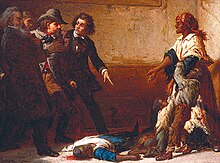When I was a girl living in East New York, I remember summer time by the arrival of the Watermelon men. In my mind, they remind me of Christina Rossetti’s poem "The Goblin Market." They were magical men with fruit in their hands ready to sell. They came from far away in a semi-truck. They were dark-skinned, almost burned black, even when it was not that hot in Brooklyn. They seemed to come from some far off secret place that grew watermelons like I had never seen.
Where we lived there was only the A&P or Key Food
stores. In our neighborhood, the fruit was not that good. The white owners
trucked in the worst of the worst produce. It stank or was pale and wilted. My
mother never shopped there. She always went to the Jewish neighborhood or a
whiter one. There they had better everything, even nicer watermelons. Though
white people say it is a black thing, watermelons disappear in their stores
just as fast if not faster than in black neighborhoods. When I was young, I
always knew everything was better in white neighborhoods except for those
watermelons.
They were big, as long as my arm and green with big dirty
yellow spots. The men would come and park on a Brooklyn street near a bus stop.
My mother and I would get off and there they would be. They looked tall to me
standing in the back of their truck. They had a little table to show their
wares. Sometimes if we were lucky, they would cut a watermelon right in front
of us. The man was thin, sinewy, not handsome but kind of in the way that dirt
is beautiful and good. His eyes were bright and sharp from working hard. He
wore a tight t-shirt sometimes striped. He would raise a dark hand with that
big old machete in it and go thunk, and the watermelon would fall open, split
open all red. Then came the smell. The smell you could follow all the way back
to Africa. It was that good, that deep, that sweet. You could smell the hands
and the pockets that had carried watermelon seeds from their home all the way
here past a great ocean, past great cruelty and chains. The little back seeds filled with hope, the
past, and taste.
My mother would yell, "Which one is good?"
The man yelled back, "They’re all good, mam!"
"Watermellllllllllons! Watermelllllllonen!" he
yelled, leaning out from the back of the truck hand to his mouth, hanging by
one arm. It boomed across city traffic
and sidewalks, and crowds and made them all go away. People would look up from
whatever they were doing, whatever hardships and terrors and sadness and come
get them some sweet, sweet watermelon.
My mother sometimes had a wagon, sometimes not. If not, we
took turns carrying that huge thing like it was a baby cradled in our arm as we
walked back home. When we entered the house. we told anyone who was there what
we had. The word ‘watermelon’ would fill the house like some ghost, and my
grandmother would smile her toothless smile.
Then we would cut it, not because we wanted to ruin its
beautiful green skin or hurry summer along, but because it demanded to be cut.
It would fall open on the table like a woman spreading her thighs. Then the
smell would fill the house. It would cling in the refrigerator for weeks.
Whenever you opened it, you knew it was watermelon time.
We would eat the crisp soft flesh, and it was like honey on
the tongue. You could eat it down to the rind. It was that sweet, that
good. It brought laughter with it. It
brought out tables and napkins. It made us sit in the backyard together and
talk. It made my grandma say "Umh-umh-umh that's good." It was a
magic fruit filled with good times. There would be only one of those in the
summer. The watermelon man's truck always emptied quickly. It was always gone too soon.
But when he came, I didn't live in some crime-ridden
neighborhood, disadvantaged, beleaguered, and trodden down by racism,
favoritism and sadness. No. I was someplace special, someplace where I got
something good for being who I was, for living where I did.

.jpg/170px-Ary_Scheffer_-_The_Temptation_of_Christ_(1854).jpg)




